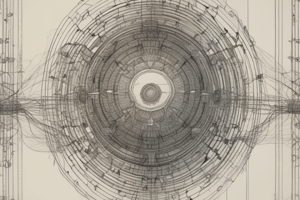Podcast
Questions and Answers
What structure divides the brain into two halves?
What structure divides the brain into two halves?
- Foramen magnum
- Cerebellum
- Cerebrum
- Tentorium cerebelli (correct)
What is most commonly observed due to a mass lesion in the brain?
What is most commonly observed due to a mass lesion in the brain?
- Central herniation
- Rostrocaudal herniation (correct)
- Lateral herniation
- Cerebellar herniation
During a tentorial herniation, which structure is primarily compressed?
During a tentorial herniation, which structure is primarily compressed?
- Medulla oblongata
- Thalamus
- Pons (correct)
- Cerebrum
What is the result of compression due to tentorial herniation?
What is the result of compression due to tentorial herniation?
Which type of hematoma is mentioned as expanding towards the tentorial notch?
Which type of hematoma is mentioned as expanding towards the tentorial notch?
What role does the periaqueductal gray play in the response to threats?
What role does the periaqueductal gray play in the response to threats?
Which structure is primarily responsible for coordinating movements during a defensive response?
Which structure is primarily responsible for coordinating movements during a defensive response?
What is the main function of the red nucleus in the context of motor control?
What is the main function of the red nucleus in the context of motor control?
Deep brain stimulation (DBS) primarily involves targeting which part of the brain?
Deep brain stimulation (DBS) primarily involves targeting which part of the brain?
Which component is NOT found within the tegmentum?
Which component is NOT found within the tegmentum?
What is the primary role of the reticular formation within the tegmentum?
What is the primary role of the reticular formation within the tegmentum?
What anatomical structure does the periaqueductal gray lie between?
What anatomical structure does the periaqueductal gray lie between?
Which function is NOT associated with the extrapyramidal system?
Which function is NOT associated with the extrapyramidal system?
What is the primary function of saccadic eye movement?
What is the primary function of saccadic eye movement?
Which structure is primarily responsible for the control of saccadic eye movement?
Which structure is primarily responsible for the control of saccadic eye movement?
What is the relationship between saccadic eye movement and the tectospinal tract?
What is the relationship between saccadic eye movement and the tectospinal tract?
Which statement about the lateral geniculate nucleus is accurate?
Which statement about the lateral geniculate nucleus is accurate?
How do both eyes behave during a saccadic eye movement?
How do both eyes behave during a saccadic eye movement?
What function does the tectospinal tract serve in relation to saccadic movements?
What function does the tectospinal tract serve in relation to saccadic movements?
What role does the thalamus play in visual perception?
What role does the thalamus play in visual perception?
What initiates the change in point of fixation during saccadic movements?
What initiates the change in point of fixation during saccadic movements?
What is the primary role of the Ascending Reticular Activating System (ARAS)?
What is the primary role of the Ascending Reticular Activating System (ARAS)?
Which neurotransmitter systems are involved in the regulation of cortical activity and alertness when stimulated?
Which neurotransmitter systems are involved in the regulation of cortical activity and alertness when stimulated?
What results from damage to the Ascending Reticular Activating System?
What results from damage to the Ascending Reticular Activating System?
In which part of the brain is the ARAS primarily located?
In which part of the brain is the ARAS primarily located?
What is the anatomical structure of the reticular formation?
What is the anatomical structure of the reticular formation?
Which subsystem of the reticular formation is specifically associated with wakefulness?
Which subsystem of the reticular formation is specifically associated with wakefulness?
What happens if the origin of the ARAS in the brainstem is damaged?
What happens if the origin of the ARAS in the brainstem is damaged?
Which of the following neurotransmitter systems is NOT mentioned as part of the ARAS?
Which of the following neurotransmitter systems is NOT mentioned as part of the ARAS?
What is primarily responsible for consciousness and balance?
What is primarily responsible for consciousness and balance?
Damage to the first order neuron leading to nucleus gracilis or nucleus cuneatus results in what kind of sensory loss?
Damage to the first order neuron leading to nucleus gracilis or nucleus cuneatus results in what kind of sensory loss?
A lesion in the midbrain affects which type of sensory loss?
A lesion in the midbrain affects which type of sensory loss?
Bulbar palsy is characterized by what type of neuron lesion?
Bulbar palsy is characterized by what type of neuron lesion?
Pseudobulbar palsy primarily results from an injury in which type of pathway?
Pseudobulbar palsy primarily results from an injury in which type of pathway?
Which nerves are primarily affected in bulbar palsy?
Which nerves are primarily affected in bulbar palsy?
What sensory function is affected by damage in the postcentral gyrus?
What sensory function is affected by damage in the postcentral gyrus?
Which of the following describes the effect of damage in the dorsal column system?
Which of the following describes the effect of damage in the dorsal column system?
Flashcards are hidden until you start studying
Study Notes
Saccadic Eye Movement
- Involves simultaneous movement of both eyes during fixation changes in the same direction.
- Directly linked to the lateral geniculate nucleus, acting as a relay for visual pathways from the retina.
- Connects with the tectospinal tract facilitating head movement while maintaining visual fixation.
- The superior colliculus controls the execution of saccadic eye movements.
- Example: Shifting focus from a cellphone to a person entering a room.
Midbrain Structures
- Ascends through the tentorium cerebelli, a dural fold separating the cerebrum from the cerebellum and brainstem.
- Clinical note: Mass lesions cause herniation, leading to compression towards the foramen magnum, potentially resulting in coma.
Tentorial Herniation
- Example: Epidural hematoma can push the cerebrum downward to the tentorial notch, causing compression of pons and brainstem structures.
Periaqueductal Gray
- Responsible for defensive reactions and autonomic sympathetic responses during threats.
- Stimulates the cerebellum for coordinated movement, aiding in the body's reaction to danger.
Deep Brain Stimulation (DBS)
- Involves implanting a neurostimulator to send electrical impulses to specific brain targets, stimulating neuronal activity.
Tegmentum
- Located between the cerebral aqueduct and cerebral peduncles, contains essential nuclei including the red nucleus and substantia nigra.
Red Nucleus
- Rich in iron, plays a role in motor coordination and planning, especially for flexor movements in contralateral limbs.
Reticular Formation
- Interconnected nuclei throughout the brainstem, crucial for behavioral arousal and consciousness regulation.
- Input regulates cardiovascular and respiratory systems, influenced by various neurotransmitter systems.
Ascending Reticular Activating System (ARAS)
- Essential for regulating wakefulness and alertness, heavily involving noradrenergic and acetylcholine systems.
- Damage to ARAS can lead to coma or death depending on the severity and location of the injury.
Sensory Pathways and Lesions
- Damage to first order neurons leads to ipsilateral loss of sensory modalities like touch and position sense.
- Injury in postcentral gyrus or midbrain results in contralateral sensory loss.
Bulbar Palsy vs. Pseudobulbar Palsy
- Bulbar palsy: Lower motor neuron lesions affecting cranial nerves IX, X, and XII.
- Pseudobulbar palsy: Upper motor neuron lesions impacting the corticobulbar tract affecting the same cranial nerves.
Studying That Suits You
Use AI to generate personalized quizzes and flashcards to suit your learning preferences.


